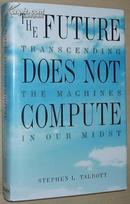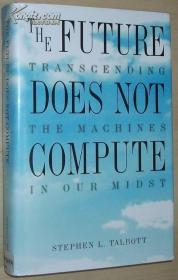
The Future Does Not Compute: Transcending the Machines
¥ 30 九品
仅1件
作者Steve Talbott
出版社不详
ISBN9781565920859
出版时间1905-06
页数500页
货号hw62
上书时间2012-03-17
- 在售商品 暂无
- 平均发货时间 14小时
- 好评率 暂无
- 店主推荐
- 最新上架
商品详情
- 品相描述:九品
- 商品描述
- 英文原版书 The Future Does Not Compute: Transcending the Machines in Our Midst [Hardcover] Steve Talbott (Author) Publisher: O\'Reilly & Associates, Inc.; 1st ed edition (May 8, 1995) Language: English Product Dimensions: 9.1 x 6.3 x 1.5 inches Shipping Weight: 1.8 pounds Book DescriptionPublication Date: May 8, 1995Many pundits tell you that the computer is ushering us toward a new Golden Age of Information. A few tell you that the computer is destroying everything worthwhile in our culture. But almost no one tells you what Stephen L. Talbott shows in this surprising book: the intelligent machine gathers its menacing powers from hidden places within you and me. It does so, that is, as long as we gaze into our screens and tap on our keyboards while less than fully conscious of the subtle influences passing through the interface.Talbott awakens us to these influences by conducting a wide-ranging tour:Why do we hail the birth of the electronic global village just as villagers around the world are killing each other? Is the Net an instrument for social dissolution? Do the Renaissance origins of virtual reality throw light on our world-creating and world-destroying choices today? Does reality have a future? Were the barriers to creation of thinking machines clarified by a little-known philologist investigating the mythic consciousness of the ancients? Does the computer centralize or decentralize structures of power? Or does this question miss the point, because intelligent machines that run by themselves are creating a new global totalitarianism *without a despotic center*? Is the frantic urging to put schoolchildren on the Internet any more reasoned than the seventies\' fad for programmed instruction, or the eighties\' fad for computer literacy? Does an unrecognized law link the public face and the dark underside of the Net? If so, can we expect flame wars, weird impersonations, pornographic commerce, and Net psychoses to grow increasingly pronounced and erratic, while at the same time the reasoned mechanisms for filtering \"strict business\" from the chaos steadily gain in effectiveness? Is artificial intelligence raising machines to a human level, or are we descending to the machine\'s level?After reading The Future Does Not Compute, you will never again be able to sit in front of your computer with quite the same glazed stare.(BACKCOVER COPY) The technological Djinn, now loosened from all restraints, tempts us with visions of a surreal future. It is a future with robots who surpass their masters in dexterity and wit; intelligent agents who roam the Net on our behalf, seeking the informational elixir that will make us whole; new communities inhabiting the clean, infinite reaches of cyberspace, freed from war and conflict; and lending libraries of \"virtually real\" experiences that seem more sensational than the real thing.Not all of this is idle or fantastic speculation -- even if it is the rather standard gush about our computerized future. Few observers can see any clear limits to what the networked computer might eventually accomplish. It is this stunning, wide-open potential that leads one to wonder what the Djinn will ask of us in return for the gift. After all, any potential so dramatic, so diverse, so universal, can be taken in many directions. That is its very nature. Who will choose the direction -- we, or the Djinn?The intelligent machine receives a shadow of our own intelligence. This shadow consists of all the collective, automatic, sleepwalking, deterministic processes we have yielded to. That is, it consists of our own willingness to become machines. The crucial question today is whether we can wake up in time. Only in wakefulness can we distinguish ourselves from the automatisms around us. Where we remain asleep -- where we live in our own shadow -- we are the Djinn.The Net is the most powerful invitation to remain asleep we have ever faced. Contrary to the usual view, it dwarfs television in its power to induce passivity, to scatter our minds, to destroy our imaginations, and to make us forget our humanity.And yet -- for these very reasons -- the Net may also be an opportunity
相关推荐
-

What Does My Future Hold?
九品北京
¥ 75.00
-

Albarrán Cabrera: Remembering the Future
九五品北京
¥ 480.00
-

Albarrán Cabrera remembering the future
全新郑州
¥ 1200.00
-

英文原版书 The Future Does Not Compute: Transcending the Machines
九品北京
¥ 30.00
-

DOES SCIENCE NEED A GLOBAL LANGUAGE?English and the Future of Research
九品平顶山
¥ 55.00
-

THE FUTURE
八五品濮阳市
¥ 24.00
-

OFFSHORE APOCALYPSE:The Collapse of the Tax Haven Industry --What Does the Future Hold?
九品石家庄
¥ 13.00
-

WHAT DOES MY FUTURE HOLD (我的未来是什么)
八五品江门
¥ 50.00
-

OFFSHORE APOCALYPSE THE COLLAPSE OF THE TAX HAVEN INDUSTRY -WHAT DOES THE FUTURE HOLD?【 精装】
全新孝感
¥ 30.00
-

Fixing the Future
八五品广州
¥ 190.00
— 没有更多了 —

















以下为对购买帮助不大的评价